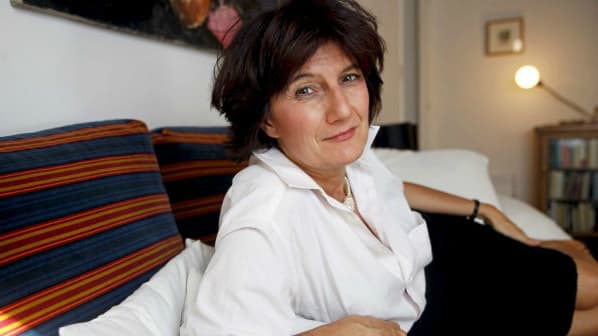In 1934, upon returning to New York from France, expatriate novelist Henry Miller lamented that the American female was bland and conformist, lacking the charged eroticism of Parisian women. If one were to replace the actresses of the New York stage with "a poor, skinny, misshapen French woman with just an ounce of personality," Miller grumbled, it "would stop the show. She would have what the Americans are always talking about but never achieve. She would have it. America is minus it."
Eighty years later, the stereotype persists. Our shelves are full of books about how French women do everything better than their American counterparts. There’s Debra Ollivier’s Entre Nous: A Woman’s Guide to Finding Her Inner French Girl; Pamela Druckerman on no-nonsense parenting in Bringing Up Bébé; Mireille Guiliano on French Women Don’t Get Fat and Jamie Cat Callan on French Women Don’t Sleep Alone.
But in her new memoir, The Art of Sleeping Alone, French Elle editor Sophie Fontanel upends Miller’s classic image. Unlike the storied French seductress, Fontanel found sex to be a painstaking chore, and decided to give it up entirely. “I chose to live in what was perhaps the worst insubordination of our times,” she writes in the book’s introduction, acknowledging that abstaining from sex was a kind of sacrilege—“a strangeness worse than difference”—in France’s sex-saturated culture.
Despite the book’s puritanical premise, Fontanel retains her feminine mystique—that certain je ne sais quoi that eludes her American cousins—and converts every mundane experience into an ecstatic reverie. On a ski vacation, she could sleep with the resort’s “tanned, athletic” owner but instead returns to her room alone to fantasize about life sans coitus: “With snow all around, my destiny seemed to me like an Eden sweet with birdsong. My life would be soft and fluffy. I was through with being had.”
So begins Fontanel’s memoir of self-discovery, a darker (more Gallic) answer to Elizabeth Gilbert’s bestselling Eat Pray Love. Where Gilbert indulges us in every phase of her soul-searching journey—from her post-divorce misery and subsequent pleasure binge in Italy to her regeneration in an Indian ashram and, predictably, her new love and happiness in Bali—Fontanel strings together her narrative in a series of lyrical vignettes. She confesses to giving up sex “for a long while, and I really don’t wish to say when it was or how many years it lasted.” She has since admitted in interviews that her sexless life lasted 12 years. Coerced into losing her virginity at 13 by a much older man, Fontanel glosses over the incident in two pages, as if it would be uncouth to suggest this early trauma was related to her subsequent 12 years of celibacy. But that’s Fontanel’s style: more de Beauvoir than Gilbert. She applies the same discretion that lies behind the French woman’s allure to her writing. And it works, at least for a while.
At first, Fontanel spends her Saturday nights immersed in lavender baths—her breasts “upthrust like buoys” and her hips cradled by the “palm of a sorcerer.” She spoons her pillow as she would a lover, “entrusting myself to the back of an imaginary man.” There’s a thinly veiled, solipsistic eroticism in these pleasures; she finds herself sexier in her sexlessness. “In a photo, I discovered that I’d begun to glow,” she writes. Dumbfounded by this transformation, her exes and friends insist she must be in love.
But before long, an air of self-righteousness creeps into Fontanel’s vignettes. She marvels at her exalted status in her friends’ eyes: “Not one of them could stand my singleness because it could have been theirs.” She reconnects with an old acquaintance whose insatiable appetite for sex she finds farcical. “This attraction she felt for these pleasures came from a real gift she had, her talent for coming,” Fontanel writes, tongue firmly in cheek. “In Basel she would go out onto her balcony, caress the wood of the railing, and thank heaven for her sensuality, her appreciation for saliva, clotted cream, juices, and bodies.” Would Fontanel consider a threesome? Non merci, she says, amused that she was “the one they imagined most in the extra role.”
As she retreats further into celibacy, her writing becomes increasingly gauzy and callous. Watching people emerge from le Métro, she wonders how “the shabby ones, the short fatties, the old wrinklies, the blubber-lippers, the dreadful dressers” and so on could possibly be seen as sexual beings.
But 12 years of lavender baths and imaginary lovers leaves Fontanel craving a little human touch. “I would not be able to live anymore because I realized the physical life is something that someone else gives you,” she writes, admitting that she had “gotten lost in the dream of things.” So when a married friend appears at the end of the book, determined to awaken Fontanel’s long-lost desire, they rush to her apartment. “How quickly I put my hand where it hadn’t been in so long, surprised to touch something that reassured me so much.” Of course she doesn’t say what she touched: to specify would be decidedly gauche, though we can be sure it wasn’t soft and fluffy.
Fontanel’s book is an ode to that downy existence—“a life in no way insignificant ... it was rich, a perfect match for my body and myself.” It’s a literary success insofar as no one has written so sumptuously about celibacy, but her message probably won’t resonate with American women whose associations with pleasure are more carnal than refined.

